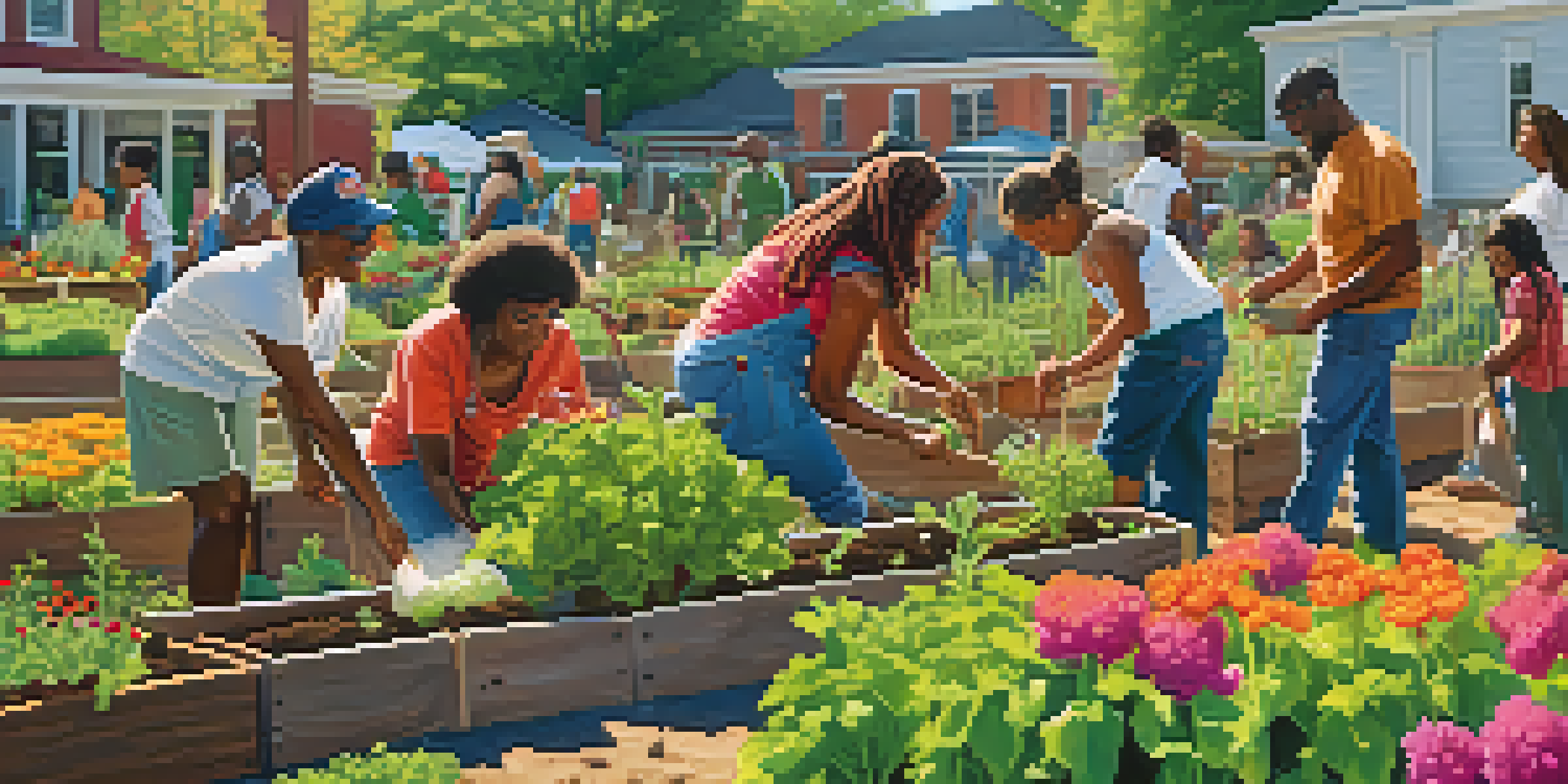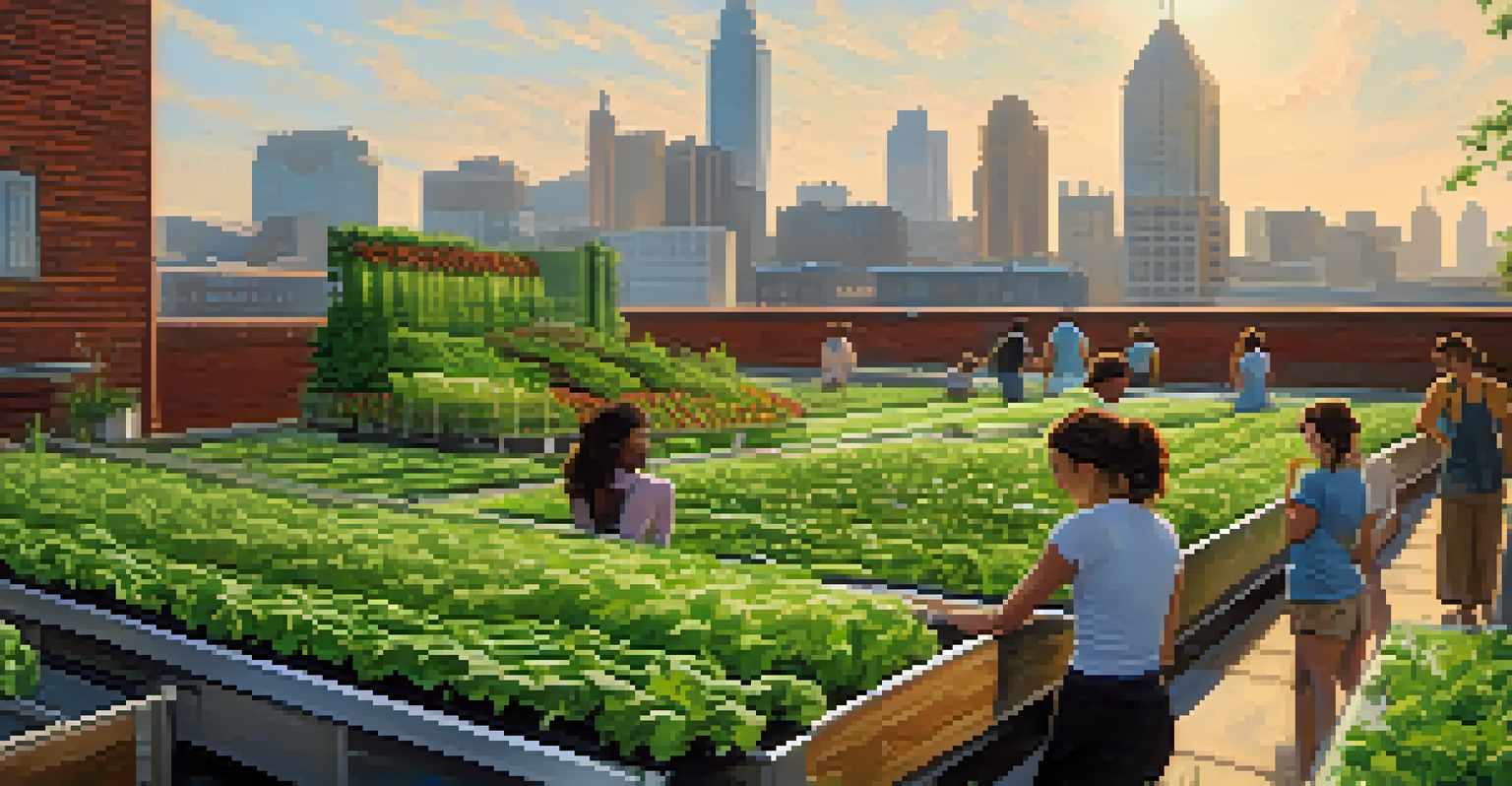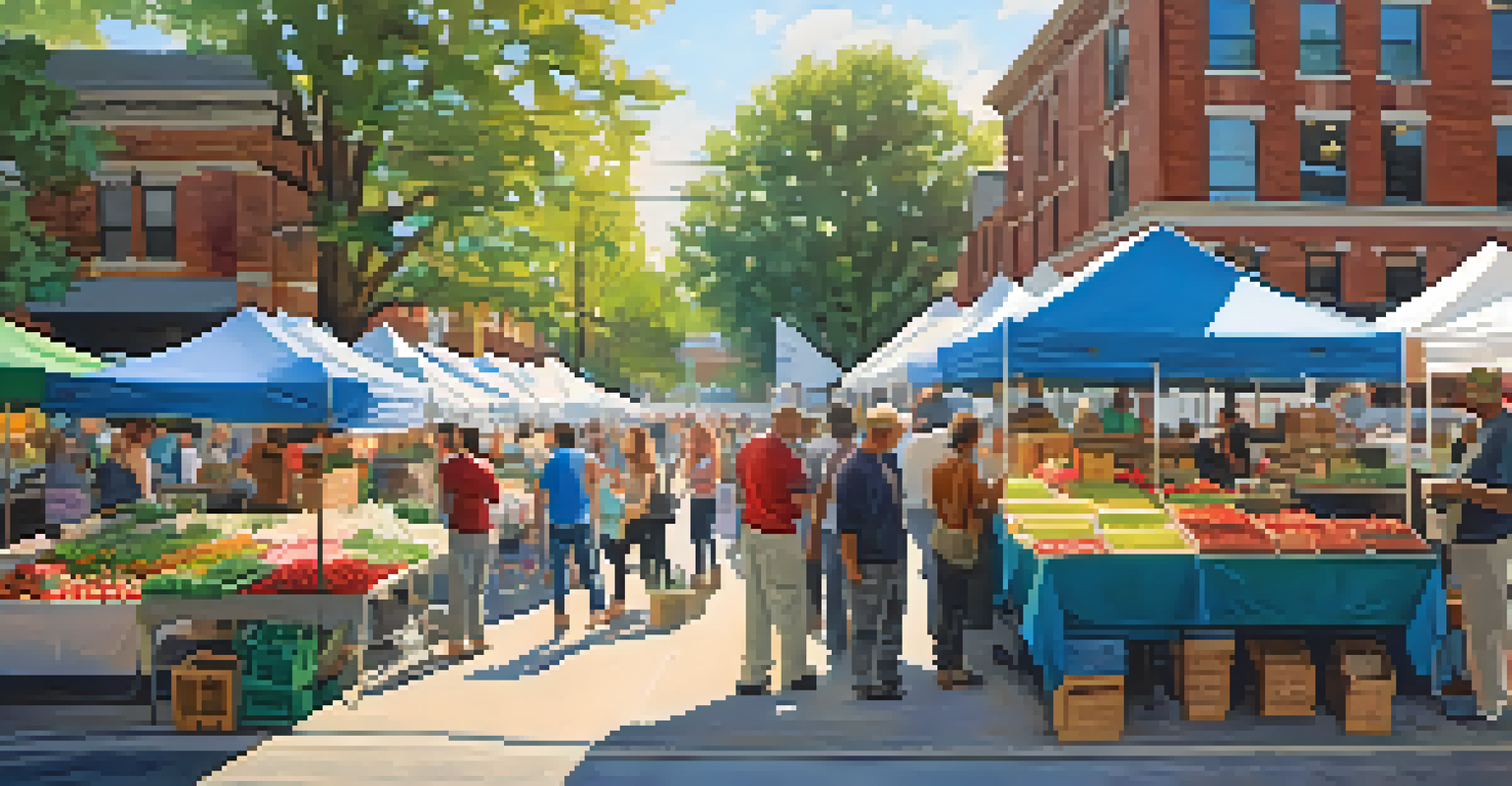Atlanta's Urban Agriculture: A Growing Movement for Change

Understanding Urban Agriculture in Atlanta
Urban agriculture refers to the practice of cultivating, processing, and distributing food in or around urban areas. In Atlanta, this movement has gained momentum as residents search for fresh, local produce amidst a bustling city environment. The blend of community gardening, rooftop farms, and educational programs has made urban agriculture a vital part of Atlanta's landscape.
Urban agriculture is not just about growing food; it is about growing community.
As the city grapples with food deserts—areas with limited access to affordable and nutritious food—urban agriculture provides an innovative solution. Local initiatives are not only about growing food but also about building relationships and fostering community. This approach emphasizes sustainability and resilience, making it a beacon of hope for many Atlanta residents.
Moreover, urban farming has the potential to impact local economies positively. By empowering individuals to grow their own food and sell it at local markets, Atlanta's urban agriculture movement is redefining how communities interact with their food sources and each other.
The Role of Community Gardens
Community gardens are a cornerstone of Atlanta's urban agriculture movement, bringing neighbors together to cultivate fresh produce. These shared spaces allow individuals to plant, tend, and harvest crops, fostering a sense of ownership and pride. They serve as green oases in the city, providing not just food but also a gathering place for social interaction.

For many, community gardens are a way to reconnect with nature and learn about sustainable practices. Workshops often accompany these gardens, teaching skills like composting and organic gardening. This education empowers residents to make healthier choices and understand the importance of where their food comes from.
Urban Agriculture Boosts Community
Urban agriculture in Atlanta fosters community engagement and resilience by providing fresh produce and cultivating relationships among residents.
Additionally, community gardens promote biodiversity and contribute to environmental health. By incorporating various plants and involving residents in maintenance, these gardens create habitats for pollinators and other wildlife, enhancing the urban ecosystem in Atlanta.
Rooftop Farms: Innovative Solutions for Urban Spaces
Rooftop farms are an exciting aspect of Atlanta's urban agriculture scene, transforming unused spaces into productive gardens. These farms maximize the potential of urban real estate, allowing city dwellers to grow food high above the ground. This innovative approach not only provides fresh produce but also serves as a testament to the creativity of urban farming.
The future of food is local, and urban agriculture is paving the way for sustainable city living.
By utilizing rooftops, farmers can bypass issues of limited land availability and soil quality common in urban settings. These farms often employ hydroponic and aquaponic systems, allowing for efficient water use and year-round production. It's a win-win situation that benefits both farmers and local residents seeking fresh ingredients.
Furthermore, rooftop farms contribute to reducing the urban heat island effect, which is prevalent in cities like Atlanta. The greenery helps cool buildings, resulting in lower energy costs and a more pleasant urban environment. This symbiotic relationship between agriculture and urban infrastructure makes rooftop farming a vital part of Atlanta's future.
Impact on Food Security in Atlanta
Food security is a pressing issue in many urban areas, and Atlanta is no exception. Urban agriculture plays a significant role in addressing this challenge by making fresh produce more accessible to underserved communities. By growing food locally, residents can enjoy healthier options while also reducing their reliance on processed foods.
Programs that promote urban farming often focus on teaching residents how to grow their own food, increasing self-sufficiency and resilience. Community members learn valuable skills that empower them to take control of their diets and nutritional choices. This hands-on approach fosters a sense of agency and pride in the food they consume.
Education Drives Urban Farming Growth
Educational initiatives in schools and local organizations empower residents with knowledge about sustainable practices and local food systems.
Moreover, local farmers' markets are becoming more prevalent, providing a direct connection between growers and consumers. These markets not only offer fresh produce but also create economic opportunities for local farmers, reinforcing the importance of community support. By prioritizing local food systems, Atlanta is paving the way toward greater food security.
Education and Awareness: Spreading the Word
Education is crucial in the urban agriculture movement, and many organizations in Atlanta are dedicated to raising awareness about its benefits. Workshops, seminars, and community events help inform residents about sustainable practices and the importance of local food systems. By equipping individuals with knowledge, these initiatives encourage more people to participate in urban farming.
Schools are also getting involved, with many incorporating gardening programs into their curricula. Children learn about the food cycle, nutrition, and environmental stewardship firsthand by growing their own fruits and vegetables. This early exposure helps cultivate a new generation of environmentally conscious individuals.
Furthermore, social media plays a vital role in spreading the message of urban agriculture. Atlanta's farming communities share success stories, tips, and resources online, creating a network of support that inspires others to join the movement. This digital connection helps bridge gaps between diverse neighborhoods and promotes a collective effort toward sustainable living.
Challenges Facing Urban Agriculture
Despite its many benefits, urban agriculture in Atlanta faces several challenges. Limited access to land, zoning regulations, and funding constraints can hinder the growth of community gardens and urban farms. Navigating these obstacles requires determination and creativity from local advocates and farmers.
Additionally, the impact of climate change poses risks to urban agriculture. Extreme weather conditions, such as droughts or heavy rains, can affect crop yields and threaten the sustainability of farming practices. As the climate continues to change, urban farmers must adapt their strategies and find innovative solutions to ensure their crops thrive.
Challenges Create Collaborative Solutions
While urban agriculture faces challenges like limited land and climate change, these obstacles inspire collaboration and innovation among community members.
However, these challenges also present opportunities for collaboration and innovation. By working together, community members can advocate for policy changes, share resources, and develop creative solutions that address these issues. The resilience of Atlanta's urban agriculture movement lies in its ability to adapt and evolve in the face of adversity.
The Future of Urban Agriculture in Atlanta
Looking ahead, the future of urban agriculture in Atlanta appears bright, with a growing focus on sustainability and community engagement. As more residents recognize the benefits of local food systems, the demand for urban farming will continue to rise. This shift in mindset is crucial for fostering a healthier and more resilient city.
Additionally, collaboration between local governments, non-profits, and community organizations is essential to support the growth of urban agriculture. By investing in infrastructure, providing funding, and creating supportive policies, stakeholders can help create an environment where urban farming can flourish. This collaborative approach will ultimately strengthen the community as a whole.

As we move forward, it is important to celebrate the achievements and progress made in Atlanta's urban agriculture movement. By highlighting success stories and inspiring others to get involved, we can create a lasting impact on the city's food landscape. Together, with commitment and creativity, Atlanta can continue to grow as a model for urban agriculture and sustainability.